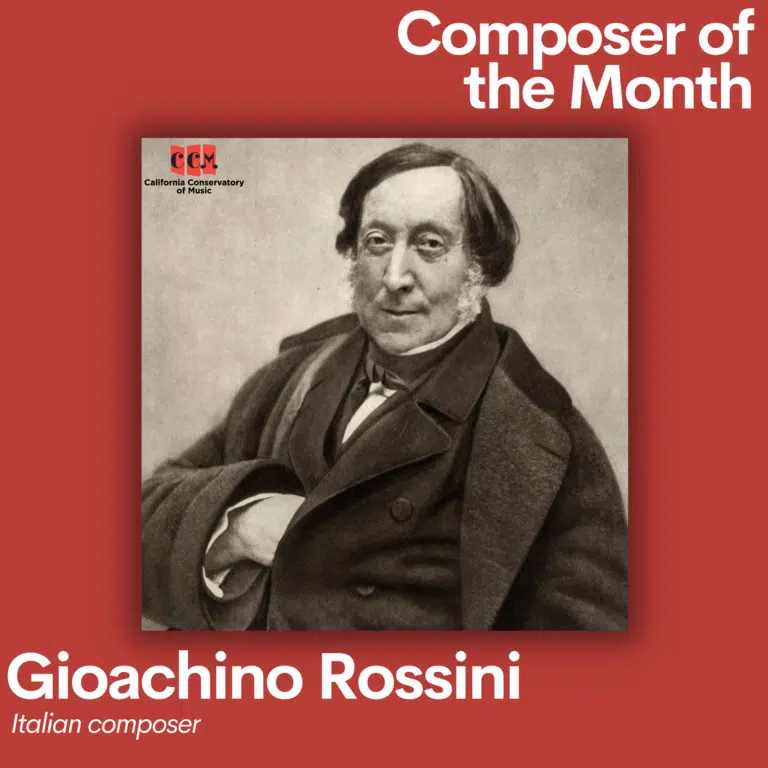April 1, 2023
Gioachino Rossini: April Composer of the Month

Gioachino Rossini is one of the most renowned Italian composers of the 19th century. His work influenced opera tremendously and he is considered to be one of the greatest composers of the bel canto era. Rossini’s melodic beauty, dramatic intensity, and sparkling wit are notable aspects of his music.
Early Life
Gioachino Rossini was born on February 29, 1792, in Pesaro, Italy. Rossini grew up surrounded by music. His father, Giuseppe Rossini, was a horn player and his mother, Anna Guidarini, was a singer. It was clear that Rossini possessed musical talents at an early age, and he began studying with his father and other local musicians. By the age of 12, Rossini was already composing music as well as playing the piano and violin.
In 1806, Rossini was accepted into the prestigious Liceo Musicale in Bologna. There, he studied with the composer and musicologist Padre Stanislao Mattei. He was a strict instructor who emphasized the study of counterpoint. Rossini learned valuable skills from Mattei, but he was still eager to explore new musical styles and techniques.
Early Works
Rossini’s composed his first opera, La Cambiale di Matrimonio, when he was only 18 years old. The modest success of the opera encouraged him to continue composing. Over the next few years, Rossini wrote a series of comic operas that established his reputation. These included L’italiana in Algeri (1813), Il Turco in Italia (1814), and Il Barbiere di Siviglia (1816).
Il barbiere di Siviglia (The Barber of Seville) is arguably Rossini’s most famous opera. It is a comic masterpiece that follows the story of the wily Figaro, as he helps the young Count Almaviva win the heart of beautiful Rosina. The opera is full of memorable melodies, witty dialogue, and clever plot twists. The aria, “Largo al Factotum,” sung by Figaro, is one of the most universally famous and recognizable pieces of music to date.
Gioachino Rossini’s success with comic operas earned him the nickname, Il Signor Crescendo (Mr. Crescendo), because of his skillful use of crescendo in his music. He mastered the use of crescendo as he built tension and excitement in the music with the dynamics.
Later Works
In the 1820s, Rossini began to stray away from comic opera and move towards more serious works. He composed a series of tragic operas, including Otello (1816), La Donna del Lago (1819), and Semiramide (1823). While these operas were well-received, they did not achieve the same level of success as his comic operas.
By 1829, at the age of 37, Rossini retired from composing operas. He had achieved great success as a composer, but he was exhausted from the demands of the opera world.
Rossini moved to Paris in 1832, where he became a central figure in the city’s musical life. He composed a series of works for the Parisian stage, including the opera Guillaume Tell (William Tell), which premiered in 1829. Guillaume Tell was Rossini’s last opera and is considered by many to be his masterpiece. The opera tells the story of the Swiss folk hero William Tell, as he leads a rebellion against the Austrian oppressors. It features a number of well-known arias, including the famous overture, which is frequently heard in popular culture.
Rossini’s later works show a departure from the bel canto style of his earlier operas. He began to experiment with new forms and musical techniques, such as the use of the chorus and the integration of spoken dialogue. As he became interested in French opera, his later works showed the influence of French composers such as Gluck and Meyerbeer.
Legacy
Gioachino Rossini’s influence on the opera cannot be overstated. His comic operas are still performed today and continue to delight audiences with their wit and humor. His serious operas, while less well-known, are still admired for their dramatic power and musical sophistication.
In addition to his opera contributions, Rossini was also an important figure in the development of orchestral repertoire. He composed several overtures and other instrumental works that are still performed today. His overtures, in particular, are known for their lively rhythms and catchy melodies.
Rossini’s influence can be seen in the work of many later composers as well. His use of the crescendo, for example, was adopted by composers such as Wagner and Verdi. His tuneful melodies and lyrical style were also influential on composers such as Donizetti and Bellini.
Sign up for your free lesson at the California Conservatory of Music!

